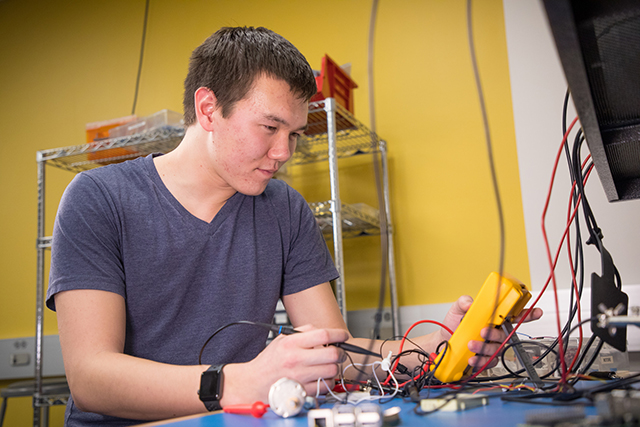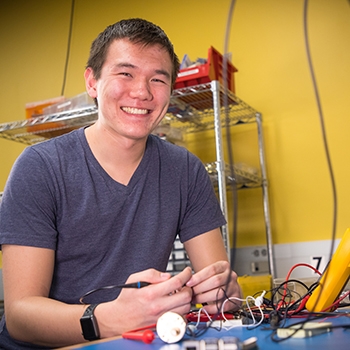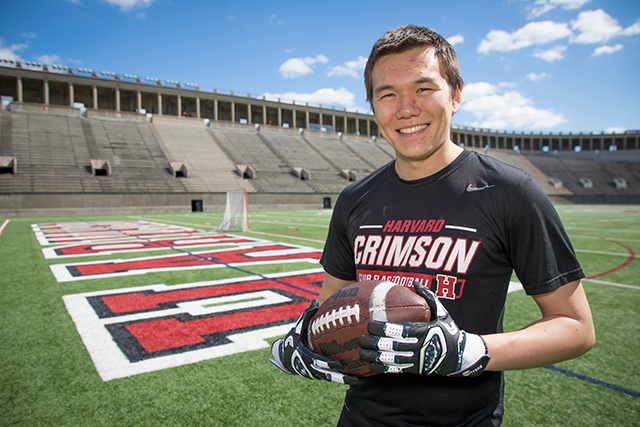Electrical engineering concentrator Cameron Akker established MakeHarvard, the University's first engineering hackathon. (Photo by Eliza Grinnell/SEAS Communications.)
Why did you decide to concentrate in electrical engineering?
Electrical engineering as a field is only just over 50 years old. In fact, I get to take classes from faculty who were there at the start, who know a time before transistors and before integrated circuits. So in a way, it feels like it’s on the cutting edge of new discoveries. What we’re going to be using for computing equipment is probably going to be very different in 10 years. I have no idea what that’s going to look like.
What is your senior thesis project?
I’m developing smart insoles. A lot of people have Apple watches, Fitbits, or other wrist-based tracking devices. I have one myself. But some people who want to keep track of these fitness metrics don’t want to wear something on their wrist. A smart insole would be packed with these sensors and have the ability to keep track of steps, gait, and other things related to a person’s movement. What if you knew the exact number of steps you took, and it wasn’t a guessing game based off something in your watch? With smart insoles, you would know exactly how many times your foot touches the ground. The crux of the project is much more specific, accurate data tracking relating to physical exercise.
What have you enjoyed about being a SEAS course assistant?
I’ve had the wonderful opportunity to be a teaching fellow for Introduction to Electrical Engineering (ES 50) and Laboratory Electronics (ES 153). Within those classes, you get to introduce students to the concept of electronics and electrical engineering. People have this misconception that engineering is all about math, complex equations, and Greek letters; all the stuff that makes it obtuse and hard to get through. In reality, as an electrical engineer, a lot of it is about intuition. Not everyone is going to be an engineer, but no one should be afraid of engineering. I hope to give people an understanding that engineering is just big-picture ideas about how the world works.

Akker said he enjoys electrical engineering because it feels like the field is on the cutting edge of new discoveries. (Photo by Eliza Grinnell/SEAS Communications.)
Tell us about your role in establishing MakeHarvard, the University’s first engineering hackathon.
A hackathon is 24 to 36 hours of straight idea production. You take an idea, flesh it out, and create a proof of concept. Before MakeHarvard, there was a computer science-oriented hackathon at Harvard called HackHarvard which I was also involved in, but there wasn’t anything focused on making physical things. We worked throughout the summer to put MakeHarvard together, and in February we hosted about 200 students from all over the U.S. who worked at SEAS for 24 hours straight to make things. Some of the results were pretty spectacular.
Why is a hackathon important?
I’ve been involved with hackathons for about eight years now, and they really are a great way to distill the process of coming up with ideas. We have this conception that ideas are something you can create with focus groups, with a lot of sitting in a room, writing down words and trying to connect them. But I’ve found that you’re more likely to have ideas when you’re not trying to have ideas, you just stumble across them. A hackathon is a chance to fail without worrying about failing. It’s a chance to do something for no client, for no purpose, for no grade—do something for the sake of doing something new.
Tell us about VHacks, which you supported as Chief Technology Officer.
VHacks is the first-ever hackathon at the Vatican. It draws on an idea from Pope Francis, who wondered how technological systems could be used to increase social inclusion and empathy. Over 36 hours, 120 college students from all over the world developed projects in three topic areas: social inclusion, interfaith dialogue, and migrants and refugees. The event was very successful—winning projects included a team that built a public, electronic job board to help the homeless find work, as well as the framework for a new credit system for migrants and refugees in new host countries. Pope Francis concluded the event by congratulating the participants of the hackathon during his Sunday Angelus blessing from the Vatican window.
Throughout his academic career, Akker's favorite time of week has been scrimmaging with the Harvard club flag football team. (Photo by Eliza Grinnell/SEAS Communications)
This wasn’t your first experience working overseas. Tell us about your work in China.
I spent two summers in China, one in Beijing and one in Shanghai, with the Harvard Summit for Young Leaders in China, teaching engineering seminars to Chinese students. Most recently, I taught a seminar on practical electronics; my goal was for each student to be able to take apart a smartphone and have a rough idea of what everything does. Working with high school students is always a joy, because I remember when I was a high school student, I was hungry for any knowledge I could get about anything, especially engineering. Getting the chance to give that to people now, to see these students’ faces light up, is so rewarding.
Tell us about your internship opportunity at Apple.
I actually took a semester off to do a co-op at Apple Computer in California. I was an engineering project manager working on hardware projects. That experience broadened my perspectives to the business side of engineering. When a large company builds something, they don’t just build one. They build thousands of units. So instead of the college project model which I’m used to, which is build one, test it, then build the next one, we were building thousands at a time. It became a matter of moving materials, keeping track of dates, keeping everything on schedule. As an engineering project manager, you get exposure to both the engineering side as well as the global supply chain, so that was a good chance to see what it takes to build a system in the professional world.
Why has SEAS been a good fit for you?
SEAS is wonderful because it doesn’t restrict you to just do your part and get out. You can get as much as you want from SEAS depending on who you want to talk to, where you want to learn. And I’ve really taken advantage of that, because I’ve taken classes in everything from basic electrical engineering, to mechanical engineering, to design and supply chain. When you’re an engineer at SEAS, you’re not just an engineer at SEAS. You get to be an engineer plus wherever else your interests lie, which is a wonderful thing.
Name: Cameron Akker
Concentration: Electrical engineering
Graduation year: Winter, 2018
Hometown: Sammamish, Wash.
Hobbies: Flag football, cooking
Fun fact: In 2016, Cameron hiked the Camino de Santiago trail in Northern Spain with his mother, walking 8 hours a day for nearly 30 days to complete the more than 500-mile journey.
Cameron Akker, S.B.’18
Electrical Engineering concentrator Cameron Akker discusses his time as an undergraduate at Harvard John A. Paulson School of Engineering and Applied Sciences.
Press Contact
Adam Zewe | 617-496-5878 | azewe@seas.harvard.edu

